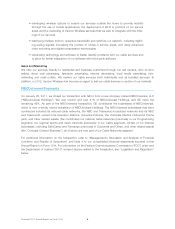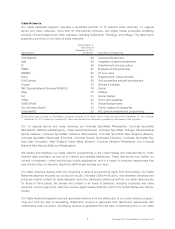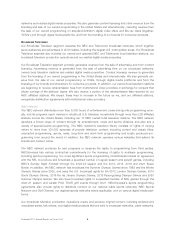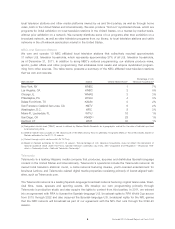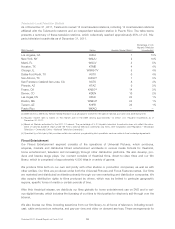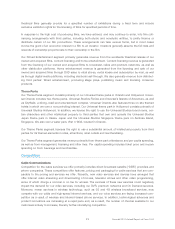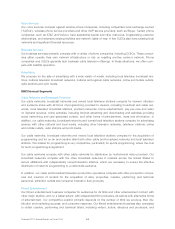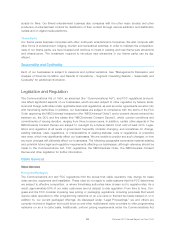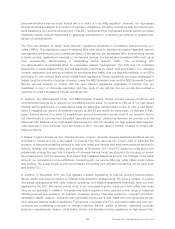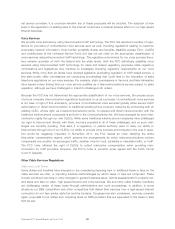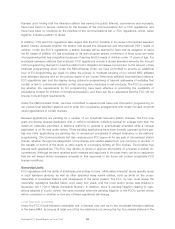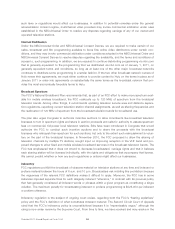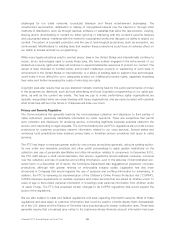Comcast 2011 Annual Report Download - page 18
Download and view the complete annual report
Please find page 18 of the 2011 Comcast annual report below. You can navigate through the pages in the report by either clicking on the pages listed below, or by using the keyword search tool below to find specific information within the annual report.may affect our ability to respond to increased competition through offers that aim to retain existing customers
or regain those we have lost.
Program Carriage/License Agreements
The Communications Act and FCC regulations prohibit cable operators and other multichannel video pro-
viders from requiring a financial interest in, or exclusive distribution rights for, any video programming network
as a condition of carriage, or from unreasonably restraining the ability of an unaffiliated programming network
to compete fairly by discriminating against the network on the basis of its non-affiliation in the selection,
terms or conditions for carriage. The FCC recently adopted regulations that we believe increase the likelihood
of program carriage complaints and is considering proposals to further expand program carriage regulations
that may be disadvantageous to us. In December 2011, an FCC Administrative Law Judge ruled against us in
a program carriage complaint initiated by The Tennis Channel. We have challenged that decision at the FCC
and, if necessary, will challenge the decision in court. We have been involved in other program carriage dis-
putes at the FCC and may continue to be subject to program carriage complaints in the future. The
NBCUniversal Order also prohibits discriminating against a network on the basis of its non-affiliation in the
selection, terms or conditions for carriage, under a standard that is comparable to existing law. It also
requires that, if we place news and/or business news channels in a channel lineup “neighborhood,” we must
place all independent news and business news channels in that neighborhood; Bloomberg Television has
filed a complaint that attempts to invoke this condition. Adverse decisions in disputes under the program car-
riage regulations or NBCUniversal Order conditions could negatively affect our business.
Must-Carry/Retransmission Consent
Cable operators are currently required to carry, without compensation, the programming transmitted by most
local commercial and noncommercial television stations. Alternatively, local television stations may choose to
negotiate with a cable operator for retransmission consent, under which the station gives up its must-carry
right and instead seeks to negotiate a carriage agreement with the cable operator. Such an agreement may
involve payment of compensation to the station. We have recently begun paying certain local television sta-
tions in exchange for their required consent for the retransmission of broadcast programming to our video
services customers and expect to continue to be subject to increasing demands for direct monetary compen-
sation and other concessions from local television stations.
Now that broadcasters have completed their transition from analog to digital transmission, cable operators
generally are required to carry the primary digital programming stream of local broadcast stations, as well as
an analog version of the primary digital programming stream on systems that are not all digital. These
requirements are scheduled to last until June 12, 2012, subject to possible extensions. For information on
must-carry and retransmission consent issues relating to our broadcast television business, see “Broadcast
Television” below and refer to the “Must-Carry/Retransmission Consent” discussion within that section.
Leased Access
The Communications Act requires a cable system to make available up to 15% of its channel capacity for
commercial leased access by third parties to provide programming that may compete with services offered
directly by the cable operator. While we have not been required to devote significant channel capacity to
leased access to date, the FCC has adopted regulations that dramatically reduce the rates we can charge for
leased access channels, although their implementation has been stayed by a federal court pending the out-
come of a challenge brought by us and other cable operators and also has been blocked by the Office of
Management and Budget. If implemented, these regulations could adversely affect our business by sig-
nificantly increasing the number of cable system channels occupied by leased access users and by
significantly increasing the administrative burdens and costs associated with complying with such regulations.
Comcast 2011 Annual Report on Form 10-K 16


